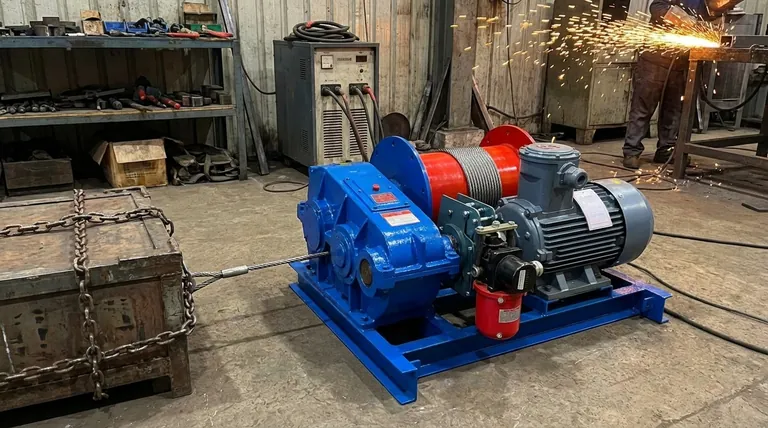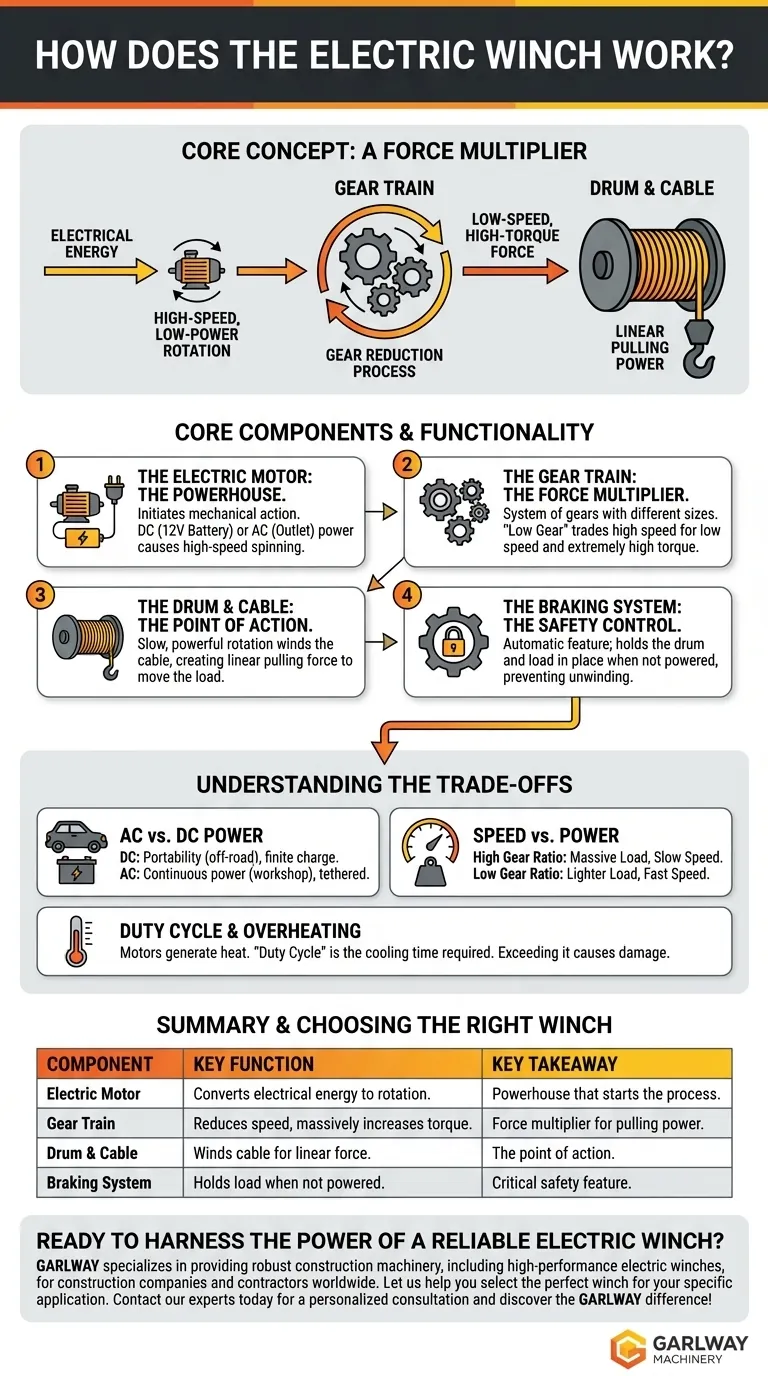At its core, an electric winch is a force multiplier. It converts electrical energy from a power source, like a battery or outlet, into powerful mechanical force. This is achieved when an electric motor drives a series of gears that rotate a drum, which in turn winds a steel cable or synthetic rope to pull, lift, or position an immense load.
An electric winch doesn't create new energy; it masterfully transforms high-speed, low-power rotation from its motor into low-speed, high-torque force at the drum. This conversion, accomplished by a gear train, is what allows a compact device to pull thousands of pounds.

The Core Components and How They Work
To truly understand the winch, you must understand how its key parts interact. Each component has a distinct role in converting a simple electrical current into immense pulling power.
The Electric Motor: The Powerhouse
The process begins with the electric motor. It's the heart of the winch, responsible for initiating the entire mechanical action. These motors operate on either Direct Current (DC), typically from a vehicle's 12-volt battery, or Alternating Current (AC) from a standard power outlet.
When you press the button on the controller, electricity flows to the motor, causing it to spin at a very high speed.
The Gear Train: The Force Multiplier
A motor spinning at thousands of RPMs doesn't have the raw twisting force (torque) to pull a heavy object. This is where the gear train comes in. It's a system of gears with different sizes and tooth counts.
Think of it like the gears on a bicycle. A low gear makes it easy to pedal up a hill (high torque) but you move slowly. A high gear lets you go fast on a flat road (high speed) but is hard to pedal from a stop. The winch's gear train is permanently in a very "low gear."
This gear reduction process trades the motor's high speed for low speed and extremely high torque. This is the secret to the winch's power.
The Drum and Cable: The Point of Action
The slow but powerful rotation from the gear train is transferred to the drum. As the drum turns, it neatly winds the steel cable or synthetic rope around itself.
This winding action is what creates the linear pulling force. The load attached to the end of the cable is pulled steadily toward the winch.
The Braking System: The Safety Control
An essential and often automatic feature is the braking system. When the motor is not actively pulling, the brake engages to prevent the drum from unwinding under load. This is critical for safety, as it holds the heavy object in place without relying on constant power from the motor.
Understanding the Trade-offs
While powerful, electric winches are governed by fundamental physical and electrical limitations. Understanding these trade-offs is key to using them effectively and safely.
Power Source: AC vs. DC
A DC-powered winch offers incredible portability, making it ideal for vehicle recovery and off-road use. Its major limitation is its reliance on a battery, which has a finite charge and can be drained under heavy, prolonged use.
An AC-powered winch provides continuous, consistent power as long as it's plugged in. This makes it perfect for workshop or industrial settings, but it is completely tethered to its power source.
The Speed vs. Power Equation
The gear ratio that gives a winch its power also makes it slow. A winch with a very high gear ratio can pull a massive load, but the cable will reel in very slowly.
Conversely, a winch designed for lighter loads might have a lower gear ratio, allowing it to reel the cable in much faster. You must always choose between maximum pulling capacity and line speed.
Duty Cycle and Overheating
Electric motors generate significant heat, especially under heavy strain. A winch's duty cycle is the amount of time it can run before it needs to cool down. Exceeding this can cause permanent damage to the motor.
Heavy pulls create more heat and require longer cooling periods. It's a critical factor often overlooked by novice users.
Making the Right Choice for Your Goal
Your specific application dictates which type of winch and what features are most important.
- If your primary focus is vehicle recovery or off-roading: A 12-volt DC winch with a high gear ratio for maximum pulling power and a robust braking system is your essential tool.
- If your primary focus is stationary lifting in a workshop: An AC-powered winch provides the reliability and consistent power you need without concerns about battery life.
- If your primary focus is moving lighter loads quickly: A winch with a lower gear ratio will offer a faster line speed, improving your efficiency for repetitive tasks.
By understanding these core principles, you can now select and operate an electric winch with both confidence and safety.
Summary Table:
| Component | Key Function | Key Takeaway |
|---|---|---|
| Electric Motor | Converts electrical energy into high-speed rotation. | The powerhouse that starts the process. |
| Gear Train | Reduces motor speed to massively increase torque. | The force multiplier that creates immense pulling power. |
| Drum & Cable | Winds the cable to create linear pulling force. | The point of action where the work is done. |
| Braking System | Automatically holds the load when not powered. | A critical safety feature for control. |
Ready to harness the power of a reliable electric winch?
GARLWAY specializes in providing robust construction machinery, including high-performance electric winches, concrete mixers, and batching plants for construction companies and contractors worldwide. We understand the demands of your projects and are committed to delivering equipment that offers safety, durability, and the power you need to get the job done efficiently.
Let us help you select the perfect winch for your specific application. Contact our experts today for a personalized consultation and discover the GARLWAY difference!
Visual Guide

Related Products
- Electric and Hydraulic Winch for Heavy Duty Applications
- Electric 120V Boat Winch by Badlands
- 12000 lb Heavy Duty Electric Boat Winch
- Electric Hoist Winch Boat Anchor Windlass for Marine Applications
- Heavy Duty Electric Boat Winch Windlass Anchor
People Also Ask
- Can you use an electric winch manually? A Guide to Dual-Functionality Winches
- Can an electric winch be used as a hoist? Understand the Critical Safety Differences
- Do electric winches have brakes? Essential Safety for Your Heavy-Duty Pulling
- What is the difference between electric winch and electric hoist? Essential Safety & Application Guide
- How long can you run an electric winch? Master Safe, Efficient Vehicle Recovery



















